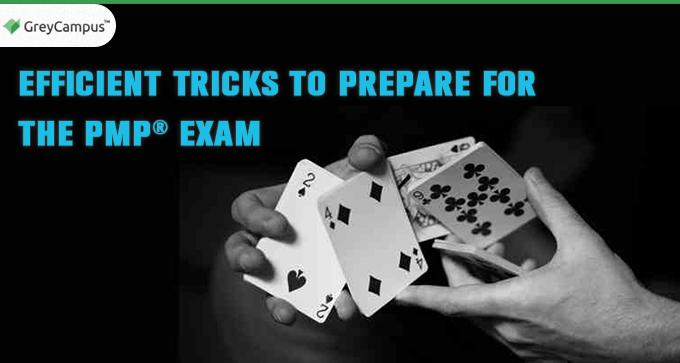Efficient Tricks to Prepare for the PMP® Exam
Finding the perfect materials to study for the exam is important, but that’s tricky to do with so much material out there. You are preparing for something you have not done before, so get a professional’s perspective (someone who has a PMP) for a study path. Knowledge is helpful when preparing for the exam. The PMP exam tests through the PMBOK Guide, but you can’t just rely on that one source because it is merely guidelines that provide only about 75% of what can be found on the PMP exam.
In order to become more culturally aware of what you will be expecting, find out from others. Keep in mind, if you have taken the exam you are not allowed to provide what the questions were on the exam, but allowed to give areas of study and what is needed to know. Books are helpful, but did you get the right book(s)? Different people learn in different ways. Did you find the appropriate means for you? Finally, when the rubber meets the road, and when you do become PMP certified – will those study hours have benefited you by learning from application and example?
These are a couple ways to become efficient in your study and become well-rounded with learning:
PMP Workshop
If you have the availability to attend a workshop, then that should be a big benefit. This is a good way to receive the bundled 35 required credit hours for PMP application. A PMP Boot camp has many great benefits to it:
1. You review about everything that should be covered on the exam:
- Nobody knows what will be on the exam. Everything is supposed to be geared from the PMBOK, but the PMBOK is only about 75% of what is on the exam because the PMBOK is basically guidelines for what you need to know. A PMP instructor knows this and can fill in the gaps through experience of exam practice.
2. You review how to study for the exam:
- The PMBOK has certain criteria that it deems important to know. Many times questions will be long with situational circumstance, but sometimes the answer comes down to a rule that needs to be comprehended. Also, there are some focus areas to put more of your precious time studying towards than others. Better to ask a pro than guess at what you should be studying.
3. Informal Questions:
- This is a great time to understand how you can apply new knowledge to your job, or perspective job. If you don’t know how to implement cost, schedule, or risk structure, for example, and you would like to know how to, then this would be a great opportunity to find out! Fundamental examples should be encouraged to shed light on practical application.
4. Relationships:
- Classes will be allotted with people who have the same goal as you. It might as well be a team effort to get over the hill. In the meantime, you might have just met someone who you can keep in touch with for the rest of your career. There could be someone in the class who you can rely on for a future trade or it could even be a future friend.
*Make sure to note that the company providing the workshop is a PMI registered education provider (REP). The company should have an ID that can be verified with PMI. The instructor you learn from should also be PMP certified.
PMI Membership – What’s Inside?
PMI members who take the test save $150 compared to nonmembers, and it doesn’t cost that much to become a PMI member ($139 at most currently). That being said, don’t stop there! Take advantage of your membership. Having access to the “Knowledge Center Virtual Library” is helpful. Go to the “eReads & Reference” area and you will find several books to peruse for free. One of the most referenced books is Christopher Scordo’s PMP Exam Prep: Questions, Answers, & Explanations. I used that book as a reference to become certified and thought it was very useful. There are also Communities of Practice (COPs) and Chapters in which you can participate with other PMPs (or aspiring PMPs) so that you can trade notes in the PMP exam journey.
Author - Gregory Morrow
